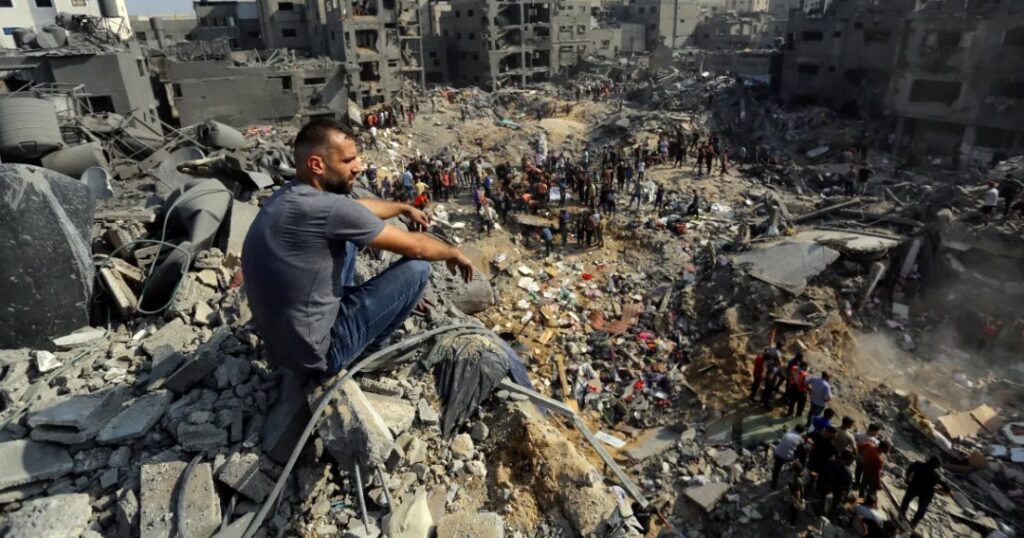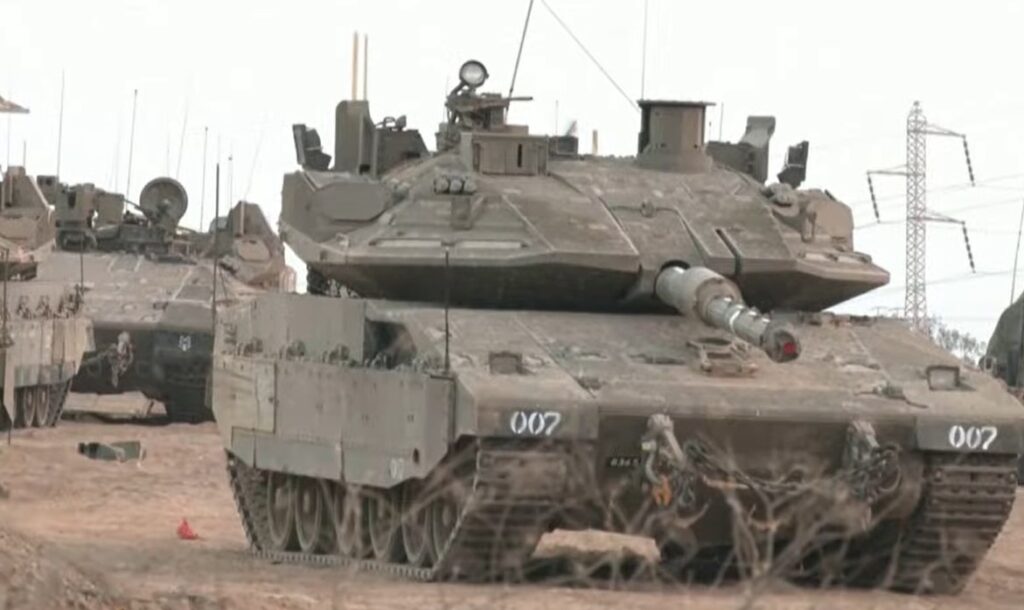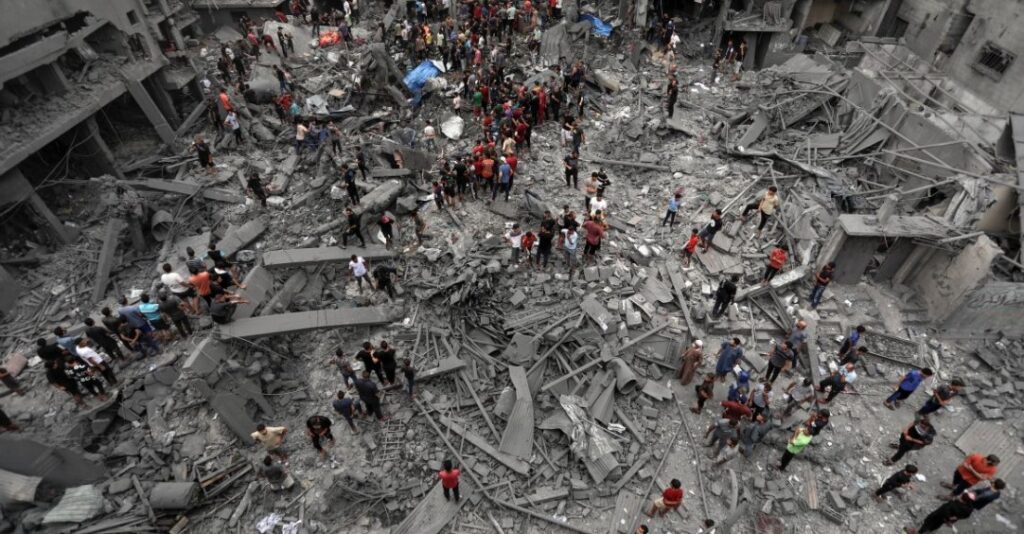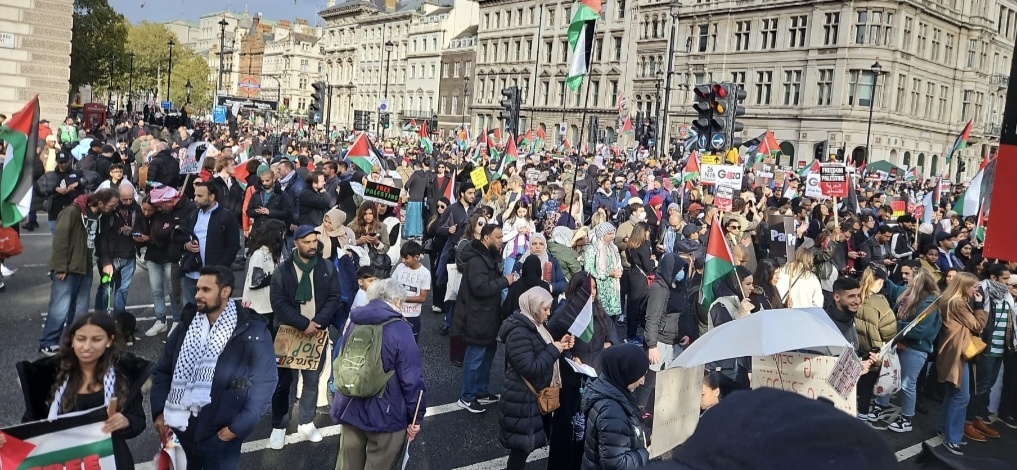By John Pickard
It is impossible to keep up with the number of labour movement organisations in the UK which have expressed some kind of protest against the ceaseless bombing of Gaza and a demand for a ceasefire. Moreover, the meetings, rallies and demonstrations we have seen here have been repeated across the globe.
In Gaza, the death toll has now passed 20,000, but with thousands missing and believed to be still buried under rubble, the real figure of the dead may be as many as 25,000. The scale of this slaughter cannot be stressed enough. The killings of Palestinians in Gaza, overwhelmingly women, children and non-combatants, is a huge figure in relation to its small population. It would be as many as two thirds of a million, if it was scaled up in proportion to the size of the UK population.
In addition to the deaths and injuries – higher than the number of deaths by a factor of at least two – whole areas of Gaza have been reduced to rubble. There is no longer a single functioning hospital, after all the medical facilities were targetted by Israeli forces. Well over eighty percent of the population – around two million people – are displaced and are exposed in the open, or sheltering as best they can in a few remaining schools and UN facilities.
The israelis have prevented the entry to food and relief convoys, so in their absence many of the population are starving. Clean water is in such short supply that UN agencies have warned of a very serious risk of disease, particularly set against the malnutrition faced by the population.
Gaza Strip is being rendered uninhabitable
The war on the population of Gaza, a collective punishment for the October 7 raid by Hamas, has all the hallmarks of genocide. It appears to be a deliberate attempt to force the Gaza population out of that narrow strip of land and into the Egyptian Sinai. Israel is making the Gaza Strip uninhabitable, even were the population able to return.

The problem that Israel faces, however, is that it is looking increasingly less likely that they can achieve these aims. They might have an overwhelming military superiority over Hamas, which Israel claims is the target of its savage assault. But the horrendous bombing of Gaza is creating waves of outrage around the world, not least in the Arab states where the popuations have a natural affinity, through history, religion and language with Palestinians.
It is the danger of mass expressions of support for Palestine within the Arab states which has pushed the USA into a limited measure of opposition to the Israeli bombing of Gaza. The USA has been the main armourer and financier of Israel for seventy-five years, and there is no sign of that support changing significantly. And it is important to bear in mind that anything Western or American politicians say – even Joe Biden’s reference to Israel’s bombing as “indiscriminate” – is mainly for public consumption and a response to growing public outrage.
But nonetheless, US strategic interests in the region are served above all by political stability and now the scale of the Israeli bombing and destruction in Gaza, as well as its tolerance of armed settlers conducting a campaign of ethnic cleansing in the occupied West Bank, are threatening political earthquakes. These would be upheavals that none of the Arab or Western leaders would relish.
“you don’t have the credit for that”
Pushed by Arab states, particularly Jordan and Egypt, the USA government has said – again, for public consumption – that two ‘red lines’ that it will not allow Israel to cross, are expelling the population of Gaza into Egypt and any reduction in the land area of Gaza. When the Israeli Defence Minister, Gallant, spoke about a war lasting ‘months’, the US Secretary of State Antony Blinken bluntly responded, “you don’t have the credit for that.”

The number of other Western politicians now calling for a ‘sustained ceasefire’ is growing almost by the day and that, too, is a reflection of public outrage. Israel is largely winning the military battle with Hamas – although its policies in Gaza and even more so in the West Bank are increasing the political support for Hamas among Palestinians – but it is losing international diplomatic and political support and that, in the longer run, will do far more damage to the Israeli right wing government than anything Hamas might do.
More that any other state in the world, Israel has relied since its foundation on the international financial and military support of Western governments. It has enjoyed a large measure of support even within the labour movement, given the history of the Nazi Holocaust as the backdrop to the foundation of the state in 1948.
Benjamin Netanyahu and the most right wing government in Israeli history are in the process of blowing away that international support. The longer the bombing of Gaza goes on, the longer Israel operates nakedly apartheid policies in the West Bank, the more Israel will become a pariah state like the former whites-only ‘democracy’ that was hated South African regime.
Jewish West Bank settlers organising pogroms
The outcome of the war cannot be anticipated in advance. If the bombing continues, it can still not be ruled out that there may be an uprising among West Bank Palestinians. They have suffered pogroms organised, with impunity, by armed Jewish settlers. There have been raids by the Israeli army, even into the larger cities – arresting and detaining without trial far greater numbers of activists than those released in last month’s hostage exchanges. Not least, West Bank Palestinians have suffered hundreds killed since October 7, through the actions of the IDF and Jewish pogromists.

As it is in Gaza, one of the Israeli army’s prime weapons in the West Bank is the armoured bulldozer, the perfect means of making sure that roads, buildings and infrastructure in Palestinian areas are put beyond use. The IDF are guilty, not only of military repression and brutality on a daily basis, but also economic and social vandalism in their deliberate destruction of property, equipment, services, roads and infrastructure on which West Bank Palestinians depend.
Neither is it ruled out that there will not be a more extensive war between Israel and the Lebanese Hezbollah, which is far better armed than Hamas, and which has units steeled by their experience in the civil war in Syria. To the South, the Houthi militias in Yemen have put the wind up international oil and container carriers, by their threats against Israeli-based shipping in the narrow waters at the South end of the Red Sea, waters through which all Suez Canal traffic and a lot of oil tankers must pass.
The mood in Israel is to support the IDF against Hamas
One way or another this war is likely to change the political map of the Middle East. That will also include Israel, although in the latter case, the process is likely to be delayed. In Israel, the predominant mood for the moment is to support the IDF. Many Israelis see the existance of Hamas as an ‘existential threat’ to Israel and there has been no noticeable absenteeism in the call-up of over a third of a million military reservists.
There is little or no news coverage in Israel itself of the carnage in Gaza, or the catastrophic plight of the Palestinian population there. Newspapers, radio and TV are dominated by the Hamas attack of October 7 and on the Israeli hostages taken by Hamas. There is anger at the killing of three hostages – reportedly bare-chested and carrying a white flag – when they tried to surrendder to Israeli soldiers. The last of the three was killed despite the Israeli commanding officer on the ground ordering a ceasefire. But even this anger will not alter the public perception among most Israelis that ‘their’ soldiers have to be supported and that Hamas has to be destroyed.
In the longer run, however Israel, too, will suffer political earthquakes. Given that Israeli politics has shifted apparently relentlessly to the right in the past two decades and now there is the most right-wing government in its history, many on the left are understandably sceptical of any change in the outlook of Israeli workers. But there will be change. The political earthquake may be delayed, but they will come.
News of the horrific bombing in Gaza will filter out in time
There are several factors that will add to the turmoil in Israeli politics in coming months. Fed only on diet of news centred on October 7 and the hostages, when the war comes to some kind of unsatisfactory conclusion, as it will do inevitably, information coming back from troops on the ground and foreign reports will partly change the focus. News and details of the horrific bombing and slaughter in Gaza will begin to filter out in Israel.

There will be inquests into the reasons for the security breach and intelligence lapses on October 7 and some appraisal of how many Israeli casualites on that day were caused by ‘friendly’ fire from the IDF. The true casualty figures of IDF soldiers killed in the Gaza fighting will be become known. There will be an inevitable political fall-out and Netanyahu, like Golda Meir after the 1973 war, will be booted out, if he is not jailed for corruption.
All of the boasts of the Israeli right wing that they are the only guarantee of ‘security’ for Israel have been shattered and, far from claiming the high moral ground internationally, Israel will be reviled by millions as an aggressive little Spartan state. It is likely that the Boycott, Disinvestment and Sanctions (DBS) movement will gain more traction than ever before in the workers’ movement internationally and that will be noted by Israeli workers and erstwhile supporters of Israel abroad.
The regular interchange from Israel and back that has been common between in the European and American Jewish communities will now be in jeopardy. Why settle in Israel, when where is no peace and no security, and, besides, little international support? There may even be a net migration out of Israel, as there has been on occasions in the past.
All of these factors will shake up the consciousness of Jewish workers in Israel to an unprecedented degree. Wars and upheavals are the drivers of social and political change much more than decades of what passes for ‘normality’.
It is impossible to anticipate in advance the detail of political development and change; that is in the nature of a volatile and unpredictable period like the one we are now in. But within the political storms that lie ahead, new ideas, new political forces and new opportunities will arise within the working class in Israel, among Jewish workers and in region as a whole among Palestinian workers.
Two key factors will influence events in Israel/Palestine
There can be no peace and security, and no economic or social advance, where one part of the community exercises its rights at the expense of the other. On the other hand, a common struggle of Jewish and Palestinian workers for a different society can offer peace, equality and economic development for all.
Whether than means two states – within agreed borders, with the right of refugees to return, and with guaranteed rights and full equality for all minorities – or whether it means a single unitary state, with full equality of all peoples, is something that will be decided by the wishes of those in the region and by the march of events.

But there are two key factors that will affect all the developments in Israel and in Palestine: the presence (or not) of a political leadership, both Israeli and Palestinian, that can point workers in the direction of common struggle, and the influence of the labour movement overseas.
That international dimension shows no sign of tailing off, and even if it abates somewhat over the holiday period, it will pick up again soon afterwards. It is difficult to think of any precedent in British politics for the continued protests against the Gaza bombing that have taken place in scores of towns and cities up and down the country. If one were to add up the total of all the demonstrators, many of whom have marched week after week, it might amount to the biggest series of demonstrations in British political history.
Multiply that by the international demonstrations and movements, and it is like the storm of tremors that anticipates a huge political earthquake. The suffering of the people of Gaza will be answered in one way or another in the coming months and years. Israel is destorying lives by the thousand, but it will be seen that it cannot destroy ideas and aspirations with high explosives.
[Picture top: one section of one of the many marches in London]



